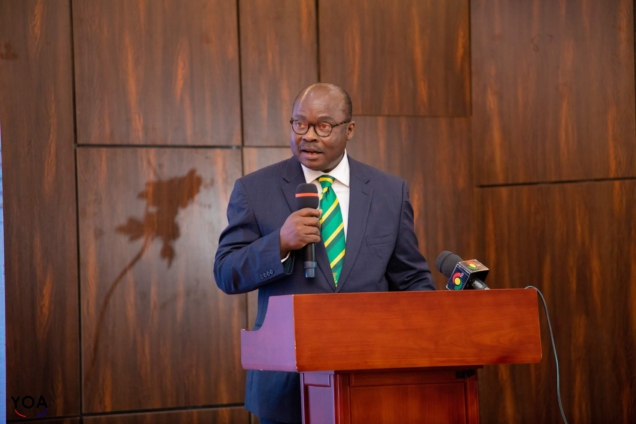The Governor of the Bank of Ghana, Dr. Ernest Addison, has stated that his administration started with a robust fiscal stance as the central bank financing from 2017 through to 2019 and 2021 was zero, even though the Bank of Ghana Act pegged it at 5% of the previous year’s tax revenue.
According to him, this pushed inflation down quickly.
Therefore, he added, the monetary policy rate also came down, and growth rebounded strongly, alluding that “This was the context for the first three years of the current administration”.
Furthermore, the Governor said on the sidelines of the ECCB 40th anniversary and Central Banking Autumn meetings in Saint Kitts and Nevis that “The early stages of the Covid-19 crisis also seemed manageable, growth was robust, but debt built up and restructuring was a challenge. The Bank of Ghana also engaged in monetary financing at a time when many central banks adopted accommodative policies.”
He mentioned that it was difficult to finance the government before the Covid-19 pandemic as “Prior to that, we had not done any monetary financing, that is financing of the budget had been zero”.
Providing financing support to government was not easy
Therefore, providing financing support to the government, he pointed out, was not an easy transition for the Central Bank to make.
“We had some good discussions going into it. The Finance Minister [Ken Ofori-Atta] went to Parliament and requested for a suspension of the Fiscal Responsibility Act due to the pandemic. This enabled us to trigger emergency provisions in the Bank of Ghana Act to provide exceptional financing for the government budget. And that’s what we did.”
“For me, it was a big reawakening, because I did not foresee that the Central Bank would be drawn into budget financing. But, given global developments, especially with central banks in advanced economies, it seemed like monetary accommodation of fiscal policy to meet Covid expenditures had become part of the norm.”, he noted.
In addition, the Governor said, the International Monetary Fund itself allocated additional SDRs, which are assets held by central banks, and designated these SDRs to help governments meet their Covid expenditures.
This meant the central bank could automatically lend on these additional resources to meet the needs of the budget, adding, this changed the psyche – having to on-lend IMF resources plus triggering the emergency provisions to provide central bank financing to the budget. This was difficult for me.
“Even in 2021, the government was able to successfully issue nearly $3 billion in debt. That helped to ensure the central bank didn’t have to provide financing", he concluded.
Latest Stories
-
“I’m so angry at myself” – Nicolas Jackson apologises after red card in Chelsea’s defeat to Flamengo
3 minutes -
Israel-Iran Conflict: Geopolitical implications and what it means for Ghana
7 minutes -
Ghana Boundary Commission assesses border security amid concerns over unapproved routes
11 minutes -
Accra: Queenmother killed at naming ceremony in Gbawe
20 minutes -
Security agencies donate GH¢1m to MahamaCares
22 minutes -
NPP urged to prioritise reforms over early primaries – CDD Fellow cautions
29 minutes -
Electric Cars: DriveEVGH showcases next‑gen EVs at Ecobank-JOYNEWS Habitat Fair at Achimota Mall
52 minutes -
NPP Race: The party needs deep reflection on the path it intends to pursue – Prof. Bokpin
53 minutes -
NPP Race: No counter motion on early primaries at NEC meeting – Haruna Mohammed
58 minutes -
Day 2 of the Ecobank-JOYNEWS Habitat Fair at Achimota Mall has the BEST DEALS to get you home!
1 hour -
Cargill provide Agro-Processing Equipment to Women in Cocoa-growing Communities
2 hours -
Cabinet approves Mahama Cares Bill
2 hours -
NYA CEO Osman Ayariga reaffirms government’s commitment to youth empowerment
2 hours -
Galamsey: No justification can excuse the extent of the destruction – Rev. Fr. Quaicoe
2 hours -
Gov’t officials involved in galamsey will face full force of the law – Shamima Muslim reiterates
2 hours

